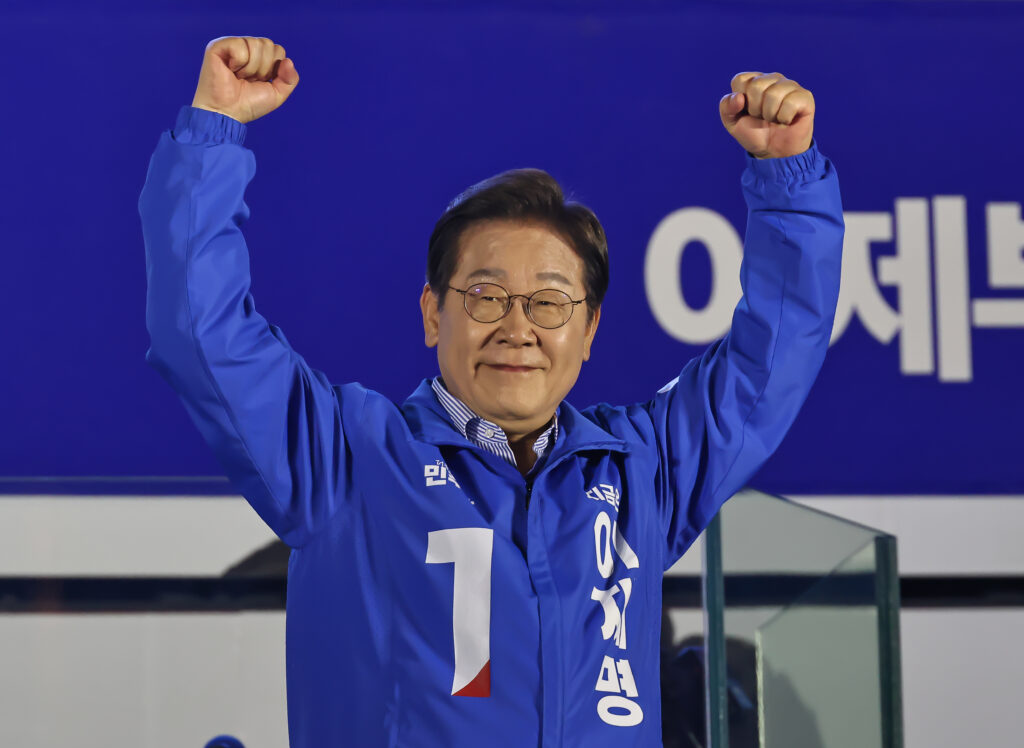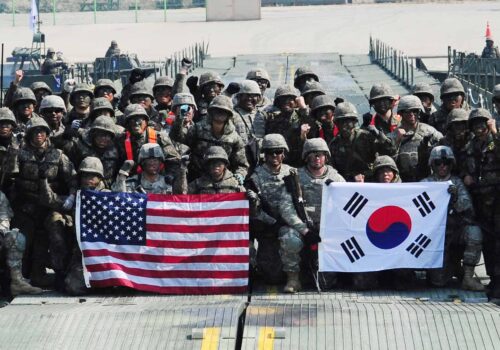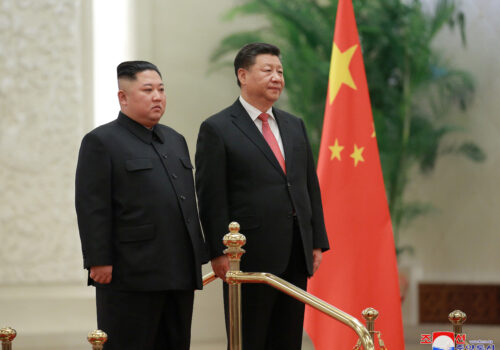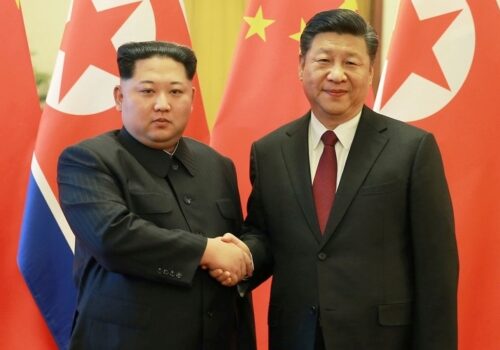No time for a victory party. Early Wednesday morning, Democratic Party candidate Lee Jae-myung was named the winner of South Korea’s presidential election, and later the same day he will be sworn into office, without the typical two-month transition period. The election and immediate instatement follow a stretch of political upheaval in South Korea. In April, conservative President Yoon Suk Yeol was removed from office, after he declared a short-lived state of martial law in December 2024. So, will Lee’s leadership mean a calmer political future for the country? Looking at the wider region, how will the leadership shift from right to left affect South Korea’s policies toward the United States, North Korea, China, and Japan? Atlantic Council experts are on the job today answering these questions and more below.
Click to jump to an expert analysis:
Sungmin Cho: For Lee, the economy comes first, but expect foreign policy shifts nonetheless
Kayla Orta: Lee’s “pragmatic” approach comes as Seoul faces a more hostile security environment
For Lee, the economy comes first, but expect foreign policy shifts nonetheless
To understand Lee’s foreign policy orientation, it is more useful to compare his positions with that of former President Moon Jae-in, rather than that of Yoon, his conservative predecessor.
Lee’s foreign policy will generally align with the Democratic Party’s traditional approach, promoting dialogue with North Korea and maintaining stable ties with China. But he is notably more pragmatic than Moon. While Moon emphasized peace and inter-Korean reconciliation, Lee advocates conditional dialogue with Pyongyang, taking a step-by-step approach toward denuclearization. His foreign policy advisers, Wi Sung-lac and Kim Hyun-chong, are known more as internationalists than nationalists, reinforcing Lee’s pragmatic stance.
Lee prioritizes economic issues, and he has repeatedly stated that economic recovery is his top priority. During the campaign, for example, he pledged to establish an “Emergency Economic Taskforce” if elected. Given this focus, Lee is unlikely to pursue major foreign policy initiatives at first, avoiding Moon’s active diplomacy among Washington, Pyongyang, and Beijing.
South Korea’s foreign policy shifts may instead stem from external developments, especially if US President Donald Trump reengages with North Korean leader Kim Jong Un. Lee would likely support a third Trump-Kim summit and would not oppose US troop reductions if Washington insists. While such moves could reduce tensions on the Korean Peninsula in the short term, there is concern that North Korea might exploit weakened deterrence to launch limited attacks against South Korea whenever it sees fit, as occurred during the 2010 crises.
Taiwan issues will test Lee’s pragmatism. Under US pressure for support, he will likely exercise strategic ambiguity to the maximum—quietly discussing contingency plans with Washington while avoiding public commitments. He will neither support nor oppose United States Forces Korea’s strategic flexibility. At the same time, Lee is likely to emphasize South Korea’s acknowledgment of the “One China” policy to maintain balance in its relations with Beijing.
In sum, Lee’s foreign policy is marked by pragmatism and economic urgency, distinguishing him from Moon’s more ideological and nationalistic approach.
—Sungmin Cho, PhD, is a nonresident senior fellow in the Indo-Pacific Security Initiative at the Atlantic Council’s Scowcroft Center for Strategy and Security and an associate professor in the Department of Political Science at Sungkyunkwan University.
Lee’s “pragmatic” approach comes as Seoul faces a more hostile security environment
Lee ran on the platform of a “pragmatic” foreign policy, but whether his administration will be able to rise above the nation’s entrenched partisan divides to strengthen South Korea’s geostrategic position within the Indo-Pacific region remains to be seen.
Six months to the day since Yoon declared martial law, South Korean citizens took to the voting booths to elect a new leader. Lee’s win over the People Power Party nominee Kim Moon-soo heralds another pendulum swing in South Korea’s political leadership. As the liberal party returns to the presidency, the battle to address South Korea’s domestic political turmoil is only just beginning, and the nation’s fierce partisan divide is likely to continue.
The political aftermath of Yoon’s call for martial law shocked the nation, weakening confidence in South Korea’s decades-long democratic institutions. The next South Korean president will have a challenging five-year term ahead to reestablish public confidence in the government at home while simultaneously addressing South Korea’s foreign policy concerns abroad.
North Korea’s ongoing weapons of mass destruction and missile programs—and its expanded security partnerships with Russia and China—present an immediate and existential threat to South Korea. Seoul faces a more hostile security environment today than it did under Moon, Lee’s liberal predecessor who leaned into diplomatic engagement with Pyongyang. Many in South Korea are increasingly concerned about North Korea’s “irreversible” nuclear arms buildup and more than 70 percent of polled citizens consistently call for South Korea’s own nuclear armament in the near future.
Amid growing regional insecurity, Seoul’s relationships with Washington and Tokyo will matter. Despite previous statements, Lee campaigned on continuing to strengthen South Korea–Japan relations, building upon his predecessor’s US–South Korea–Japan trilateral security cooperation to address the growing instability in the Indo-Pacific region. However, balancing proactive foreign policy and intensifying domestic demands, as previously seen, is not an easy task.
Overall, Lee’s “pragmatic” diplomacy may signal strategic policy investment in bridging the conservative-liberal political divide. Lee may yet step up foreign policy initiatives in South Korea’s interest, building upon his predecessor’s foreign policy agendas.
—Kayla T. Orta is a nonresident fellow in the Indo-Pacific Security Initiative at the Atlantic Council’s Scowcroft Center for Strategy and Security.
Military spending and shipbuilding are two areas of engagement with the Trump administration
Lee’s election as president of South Korea is an opportunity to restore domestic political stability and resurrect Seoul’s reputation on the international stage following the martial law declaration, impeachment, and court drama surrounding the removal of Yoon from office. Domestic stability is made possible more from the political unity of the executive and legislative branches of government under the progressive Democratic Party than from a popular mandate. Political unity will likely allow the South Korean government to break out of partisan gridlock and make gains on efficient and effective governance.
While Lee will have party unity, there is a sizable conservative opposition that maintains low degrees of trust in the more leftist elements of the Democratic Party, including the new president. Time will tell whether Lee governs more like the centrist candidate or the leftist opposition politician of his past.
If the past is representative of the future, Lee will progressively evolve toward the center on foreign policy over his five-year term, as his Democratic Party predecessor Moon did. Moon learned, despite a troubled relationship with Trump, that South Korean sovereignty was best served by close alignment with the United States rather than an arrangement that subordinates it to the People’s Republic of China. Moreover, Moon learned that a deal with the Kim regime in North Korea would not be worth the paper it was printed on. Regrettably for peace and security in Northeast Asia, the Korea-Japan relationship will likely remain cool under Lee for the duration of his term based on the entrenched views of the Democratic Party.
There is both risk and opportunity for Lee in South Korea’s alliance with the United States. Lee holds some strong cards if he plays them well.
South Korea already funds its defense at 2.8 percent of its gross domestic product (GDP), and it has one of the most capable armed forces of all US allies. Lee should set in motion an increase in defense spending to above 3 percent of GDP in 2026 and chart a path for this to increase to at least 3.5 percent by 2030, demonstrating that South Korea is the US security partner of choice. Continued maturation of the Korean armed forces will also position South Korea to defend its interests in a very difficult neighborhood, while meeting alliance transformation benchmarks and increased Korean roles in combined defense.
Second, Korean manufacturing is extremely strong, particularly in shipbuilding. Lee should leverage Korean dominance in shipbuilding to help Trump rebuild the US Navy, giving Trump a political win and assisting the United States in maintaining its global extended deterrence commitments. South Korean advanced manufacturing capacity offers additional opportunity for the United States and European rearmament efforts. Lee can leverage this assistance to advance Korea’s global economic interests on more favorable terms.
There are also risks to the relationship with Washington, especially if Lee and Trump have a personality conflict. Lee will also find trouble with the US relationship if he seeks to deepen Korea’s relations with China or is overly antagonistic to Japan, the other major US ally in East Asia.
—Shawn Creamer is a nonresident senior fellow in the GeoStrategy Initiative, Scowcroft Strategy Initiative, and Indo-Pacific Security Initiative at the Atlantic Council’s Scowcroft Center for Strategy and Security.
Lee seems poised to take a pragmatic and balanced approach to regional security
Lee’s victory in Tuesday’s presidential election was expected, given his ability to court the centrist majority and the conservative camp’s feuds to field a united force. But while Lee’s election is a victory for the Democratic Party, his populist but realist orientation is likely to make him a different type of revisionist than his more ideological predecessor Moon. Still, given the controversies surrounding Lee, as well as uncertainties over his and the Democratic Party’s policies, the new administration will struggle to unite the deep divisions in South Korea.
On the foreign policy and security front, it is possible that the new administration will take a balanced and pragmatic approach rather than a revisionist one. During the campaign, Lee talked about peace on the Korean Peninsula and restoring the 2018 military agreement with Pyongyang—trademark positions of the progressives. At the same time, he recognized the importance of the alliance with the United States and trilateral coordination with Japan—priorities for the conservatives. Even though much of this balanced approach was certainly part of Lee’s election strategy, it also reflects the strong recognition within South Korea about the importance of US-Japan-South Korea trilateral security coordination; threats posed by North Korea, China, and Russia; and the limited prospects of improving inter-Korean relations.
While there are many uncertainties about the Lee administration, Tokyo and Washington should continue working with Seoul to ensure strong, resilient, and sustainable trilateral security cooperation, which is imperative for stability in the Indo-Pacific region.
—Ryo Hinata-Yamaguchi is a nonresident senior fellow in the Indo-Pacific Security Initiative, an associate professor at Tokyo International University, and a senior adjunct fellow at Pacific Forum.
Further reading
Fri, May 30, 2025
New presidents and new nuclear developments test the United States–Republic of Korea alliance
Issue Brief By
In the coming years, the US-South Korea (Republic of Korea, or ROK) alliance is likely to be tested in at least three fundamental ways: by a concerning growth in North Korea’s nuclear and ballistic missile weapons program; by changes to ROK defense capabilities and structures, including the establishment of ROK Strategic Command (ROKSTRATCOM); and by potential strategy and policy changes under new US and ROK political administrations.
Mon, May 12, 2025
A rising nuclear double-threat in East Asia: Insights from our Guardian Tiger I and II tabletop exercises
Report By Markus Garlauskas, Lauren D. Gilbert, Kyoko Imai
A decade from now, the United States will face even tougher challenges in the Indo-Pacific than it does today. With this in mind, the Atlantic Council's Guardian Tiger tabletop exercise series is preparing mid-level government and military leaders to address such threats.
Fri, Feb 7, 2025
Toplines: The United States and its allies must be ready to deter a two-front war and nuclear attacks in East Asia
Report By Markus Garlauskas
The "toplines" from Markus Garlauskus' report on two emerging and interrelated deterrence challenges in East Asia with grave risks to US national security.
Image: Democratic Party candidate Lee Jae-myung speaks at the final campaign rally for the 21st presidential election, held at Yeouido Park in Seoul, South Korea, June 02, 2025. Matrix Images/Lee Sang-hoon REUTERS



